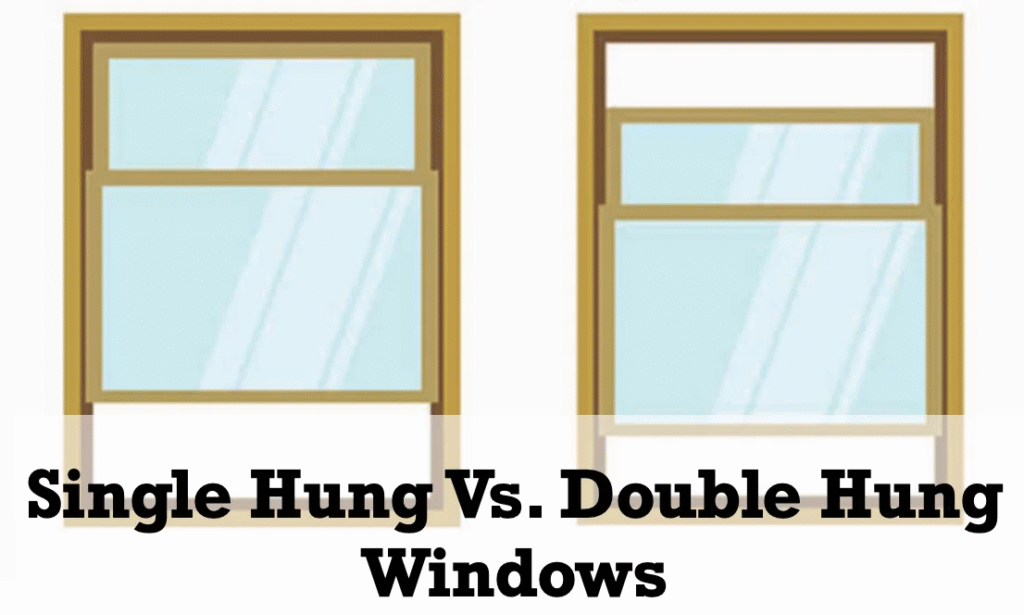
When choosing new or replacement windows for your home, the decision between single hung vs double hung windows can significantly impact your comfort, aesthetics, energy efficiency, and maintenance needs. Though both types appear similar at first glance, they differ in structure, functionality, and cost. Understanding the differences between single hung vs double hung windows can help homeowners make informed decisions suited to their specific needs.
What Are Single Hung and Double Hung Windows?
Both single hung and double hung windows feature two sashes—an upper and a lower panel. The primary distinction lies in how these sashes operate.
Single hung windows have a fixed top sash, meaning only the bottom sash is operable and can move vertically. In contrast, double hung windows allow both the top and bottom sashes to move independently.
This structural difference might seem minor but has major implications for ventilation, cleaning, and installation flexibility.
Key Differences Between Single Hung vs Double Hung Windows
1. Ventilation and Airflow
Double hung windows offer superior ventilation compared to single hung windows. Since both sashes can open, warm air can escape through the top while cool air enters from the bottom. This natural airflow can help reduce reliance on air conditioning in temperate seasons.
Single hung windows only allow air in and out through the bottom sash, limiting their ventilation capability.
2. Ease of Cleaning
Cleaning accessibility is another critical factor. Double hung windows are designed with tilt-in sashes, making it easy to clean both sides of the glass from inside your home. This is particularly useful for upper-story windows where exterior cleaning would otherwise require a ladder.
Single hung windows, on the other hand, usually only offer tilt-in functionality for the bottom sash, making it more difficult to clean the exterior of the top pane.
3. Energy Efficiency
In general, both window types can be energy efficient if manufactured with modern glazing technologies like low-E coatings and argon gas fills. However, single hung windows tend to be slightly more energy efficient by design, as they have fewer moving parts and thus fewer opportunities for air leakage.
That said, high-quality double hung windows with proper sealing and insulation can perform equally well in terms of energy efficiency.
4. Cost Differences
When comparing single hung vs double hung windows, cost often becomes a deciding factor.
Single hung windows are usually more affordable, both in terms of initial purchase price and installation costs. The simpler mechanics and reduced labor requirements make them a budget-friendly option for large-scale installations, such as in new construction.
Double hung windows typically cost more upfront due to the additional functionality and more complex design. However, the added convenience and resale value often justify the higher price for many homeowners.
5. Aesthetic Flexibility
Both window types come in a wide variety of styles, materials, and finishes to match different architectural designs. From colonial to contemporary homes, either window style can be tailored to suit your aesthetic preferences.
However, double hung windows are often favored in traditional and historic homes for their symmetrical appearance and classic lines.
6. Maintenance and Repairs
Single hung windows have fewer mechanical parts, which means fewer components are likely to break down over time. This simplicity can lead to lower maintenance requirements and fewer long-term repair costs.
Double hung windows, while more convenient, have more moving parts—springs, locks, and balances—that may require periodic servicing or replacement.
Which One Is Right for Your Home?
The answer depends largely on your budget, location, maintenance expectations, and how much you value ventilation and ease of use.
- Choose single hung windows if you’re looking for a cost-effective, energy-efficient solution with minimal moving parts. They’re ideal for rental properties, new builds, or ground-floor installations where exterior cleaning is not a challenge.
- Opt for double hung windows if you’re prioritizing ventilation, convenience in cleaning, and a traditional aesthetic. They’re especially useful in multi-story homes or in areas where air circulation is a concern.
Conclusion
In the debate of single hung vs double hung, both window types have clear advantages depending on your specific home improvement goals. While single hung windows offer simplicity and cost savings, double hung windows provide flexibility, airflow, and ease of maintenance. For many homeowners, investing in the best double-hung windows ensures long-term satisfaction, added property value, and a more comfortable living environment.